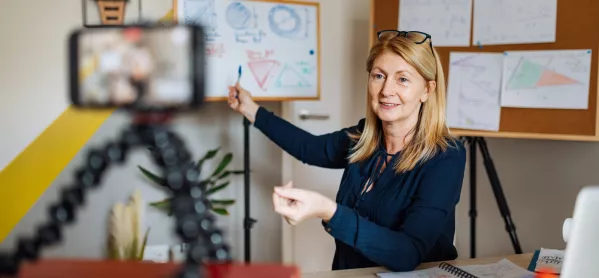"Remote" is defined by the Oxford Dictionary as “having very little connection or relationship to” – and while some of the lessons I have sat in over the years, indeed some of the lessons I have taught, have seemed very remote for me and apparently some of the learners, I am concerned that currently this term is being used incorrectly.
Many colleges are now adapting to the “new normal”, which will mean an increasing need for online and blended learning and as I enter my 70th year, and 50th in education, I am getting very Victor Meldrewish about the repeated use of the term “remote” to describe what is going on in our mid/post-Covid-19 world of schools and colleges.
Background: Lockdown – how the government wants FE to remain open
Coronavirus: Keeping colleges open 'gambles with the nation's health'
More: Ofsted moves controversial school visits online
While it is predominantly aimed at schools, the recent missive from the Department for Education gives us an idea of the thinking at the heart of education policy in all sectors. It is at least honest enough to admit they are not in the business of online learning as they offer guidance for “example lessons for remote teaching”. This seems to suggest that broadcasting talking-head teachers somehow equate to learning. It does not in my book. Indeed, they later go on to describe this initiative as “remote education”?!
As my colleague and chair of the Educational Technology Action Group (ETAG) Professor Stephen Heppell pointed out: “There is obviously a serious need for some professional development for education ministers and DfE civil servants if they think this is anything like education.”
Those colleges that accepted and embedded the spirit of the FELTAG recommendations that reported over five years ago seem to be handling the transition to the new normal of online and blended learning reasonably well, despite the lack of support from the DfE.
But a word of caution: there is a distinction between online teaching and online learning, which the DfE seems not to understand. The £5 million-funded Oak National Academy is a great example of online schooling and teaching but cannot be described as online learning. In fact, a well-respected Professor of Education who has had over 30 years' experience of online learning, a member of FELTAG and ETAG and the author of the first DfE "E-Learning Strategy" described the Oak National offer as “appalling”.
So what can FE learn from this mistaken approach taken for schools?
A piece of research from the EEF offers a more constructive view about effective learning. But sadly the EEF also falls into the trap of describing it as “remote learning” and in its press release even refers to “remote schooling”. However, the main findings are very relevant to our sector.
Interestingly the main finding of this meta-analysis is that the crucial factor in all this debate is the quality of the teaching, whether face to face, online or some sort of blend of the two.
So now we have remote education, remote schooling, remote teaching and remote learning – confused? I am. So in an attempt at clarity, I offer this explanation:
- Remote education: a system that is not related to the needs or contexts of the learners.
- Remote schooling: individual learners at home standing in front of a device singing Land of Hope and Glory in a school assembly led by the Archbishop.
- Remote teaching: much of what happens at Oak National, as talking-head teachers broadcast lessons to screensavers.
- Remote learning: no such thing – learning happens in your head so it cannot be remote.
- Online learning: a carefully and skilfully designed combination of content, creativity, co-construction, collaboration, communication, context and community supported by caring, capable, confident and compassionate teachers.
There is nothing remote about that!
Coincidentally, I am in the middle of judging the entries for a set of awards that highlight the most innovative and inspirational use of technology to enhance and extend learning and engage and empower learners across the world.
Sadly, some of the entries make the DfE's efforts look incredibly quaint and outdated.
Bob Harrison is a former teacher, lecturer and college principal, member of the Ministerial Further Education Technology Action Group, education adviser for Toshiba Information Systems and assessor at the Stanford University Graduate School of Education Masters programme “Learning Design with Technology". He is chair of Northern College and a governor at Oldham College. He tweets @bobharrisonedu





